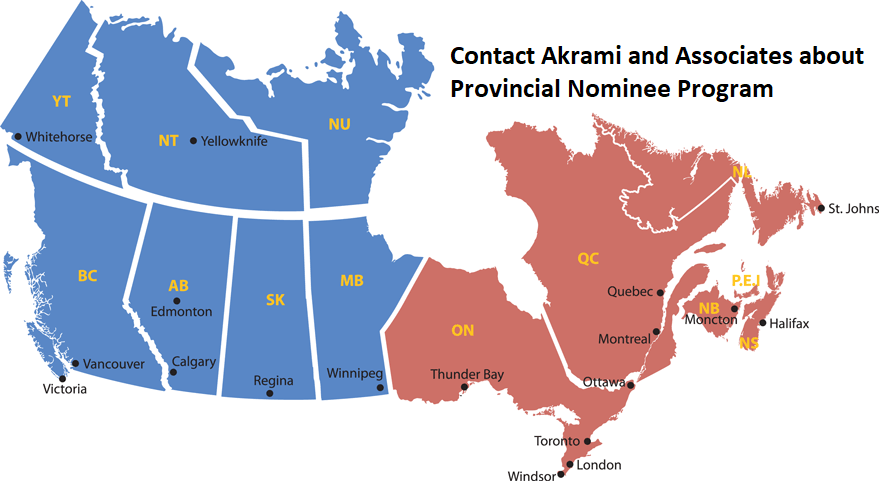Application Process for Provincial Nominee Programs
Knowing the Provincial Nominee Program (PNP)
Many Provinces and territories in Canada, with the exception of Quebec, can nominate individuals with certain skills, education, and work experience to immigrate to Canada through the Provincial Nomination Program (PNP). Since January 1, 2015, many provinces and territories have connected their own PNP programs with Express Entry. Each province and territory has their own criteria for their PNP programs; this allows provincial governments to have better control of the services and employment sectors in their region. In this blog, you will learn about the application process for Provincial Nominee Programs in Canada.
How Do I Apply For a PNP
First, you can apply directly to the PNP program you want to become involved in, based on where you want to live in Canada. The province or territory will review your application based on the following:
- Whether or not your immigration will benefit the provincial or territorial economy
- Whether or not your work experience, education, and o skills are coherent with the employment demographics and demand of the province or territory.
- If you truly plan on living in the province you applied to
Alternatively, you can apply through the Express Entry program. To do this, you must meet the minimum criteria of at least one of the federal immigration programs that fall under the Express Entry immigration categories. If you choose to apply through this process, you will have to select the provinces or territories you are interested in living in. These provinces may contact you and ask you to submit a Provincial Nomination Program application so that they can nominate you. If you have already been nominated by your province or territory, you must show this in your Express Entry profile.
After you are nominated by the province or territory, you can then start applying your permanent residence. The Immigration, Refugees, and Citizenship Canada will assess your application based on Canadian immigration law. During the process of your permanent residence application, you will be asked to provide your medical exam record and police background check (certificate). All immigrants are obligated to provide those checks, no matter where they plan to live in Canada.
How Do I Get Nominated
After you apply, either through the Express Entry system, or through the PNP directly, your application is assessed based on a variety of factors. Essentially, the PNP programs consider the same factors evaluated by the comprehensive ranking system. More specifically, you will be evaluated on your language ability, work experience, education credentials, valid job offer. Other factors, such as your relatives in Canada, your adaptability, your medical exam results, and your criminal background checks will all affect your application.
Language
One of the requirements a nominee has to meet is the language test requirements. The language test will examine your ability to listen, speak, read, and write in English or French. The minimum standard depends on each province or territory and the specific stream you have applied to.
Job Offer
Provinces and territories will also determine whether or not you have a valid job offer. If you have a valid job offer of NOC (A, B, 0), you will get points which will potentially increase your chance of getting an invitation to apply for permanent residence.
Education Credentials
When provinces and territories are deciding if you can be nominated, your education credentials will be taken into consideration. Your foreign diploma, degree and certificate will need to be assessed according to Canadian standards. Education Credentials Assessment (ECA) shows how your education credentials are comparable with the Canadian credentials.
Work Experience
Some provinces require you to have at least one year of work experience inside Canada or outside Canada; some provinces expect you to have at least six months of experience. Once again, each province and territory has different criteria, and therefore, you must know your province or territory’s rules thoroughly.
Relatives
Having relatives in Canada is also an advantage as helps establish you have strong ties to Canada, and gives extra points to help you qualify for permanent residency. Your relative must be a permanent resident or a Canadian citizen of Canada residing in that province.
Other Factors
As previously mentioned, factors such as, your adaptability and your criminal and medical checks will have an impact on your application.
Adaptability means how well you can adjust to Canadian cultures, norms, and values. More specifically, adaptability is determined on the basis of your ties in Canada. If you have a job in Canada, or if you earned Canadian education credentials, you will be more likely to adapt.
You will need to provide a medical certificate to demonstrate you do not have high medical demands. Criminal background checks indicate all your criminal history. You must not be criminally inadmissible to Canada. If you criminal inadmissible, you must overcome your criminal inadmissibility first.
Contact Akrami and Associates
Sometimes, the Provincial Nominee Program can be confusing, and this is why it is important to ask any questions you may have. By talking to immigration professionals about your concerns, this will ease your worries and assist with the application process. Many immigration applications are difficult to pursue on your own, and it is highly recommended that you seek out professional and experienced help before attempting to apply. Akrami & Associates work and have experience with many different immigration issues. We have helped many of our clients obtain permanent residency through the Provincial Nomination Program. Please feel free to contact Akrami & Associates at 416-477-2545 for more information or if you would like to book a consultation with an immigration professional for more advice.
With Akrami & Associates, there is always a way!
Latest Immigrations News

December 5, 2025
THE ULTIMATE GUIDE TO HUMANITARIAN & COMPASSIONATE (H&C) APPLICATIONS IN CANADA
THE ULTIMATE GUIDE TO HUMANITARIAN & COMPASSIONATE (H&C) APPLICATIONS IN CANADA Understanding When, Why, and How to Apply for Permanent Residence on Humanitarian Grounds What Is an H&C Application? A Humanitarian and Compassionate (H&C) application is a last-resort pathway for individuals who are in Canada and do not [...]

September 11, 2025
Canada Super Visa: Step-by-Step Guide for Parents and Grandparents
For many Canadian citizens and permanent residents, bringing parents or grandparents to Canada for extended visits is more than just a wish, it’s a heartfelt need. While most people first consider the traditional visitor visa, there is another option designed specifically for family reunification: Super Visa applications. [...]

August 23, 2025
Intra-Company Transfer (ICT) Work Permit, Your Complete Guide to Working in Canada
For multinational companies, moving key talent across borders is often essential for growth and operational success. The Intra-Company Transfer (ICT) Work Permit provides a streamlined pathway to bring experienced employees to Canada without the time-consuming Labour Market Impact Assessment (LMIA) process. For foreign professionals, it’s more than [...]

Book a Conslutation
One of our Representatives will
assist you with your matter. Book Now!
Click here

Call us for
more Information
+1-416-477-2545
Toll Free: 1-877-820-7121
Click here

Write Us (Online Form)
Complete our form and one of our
Representatives will contact you.
Click here
Subscribe To Our Newsletter


